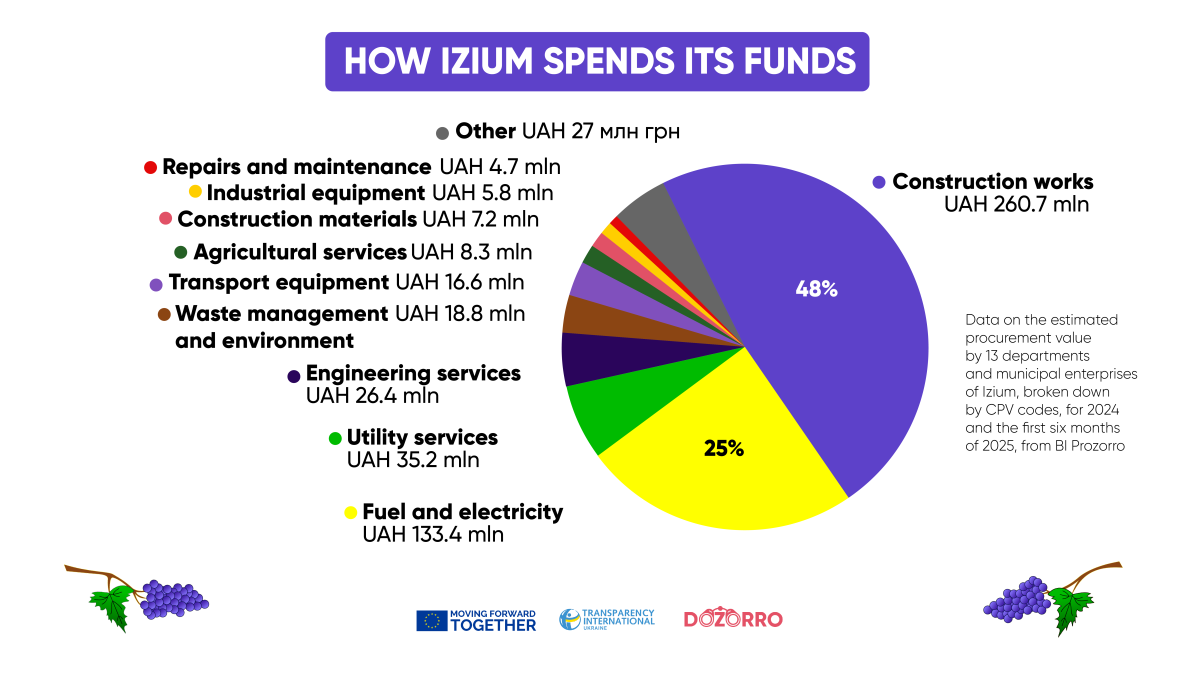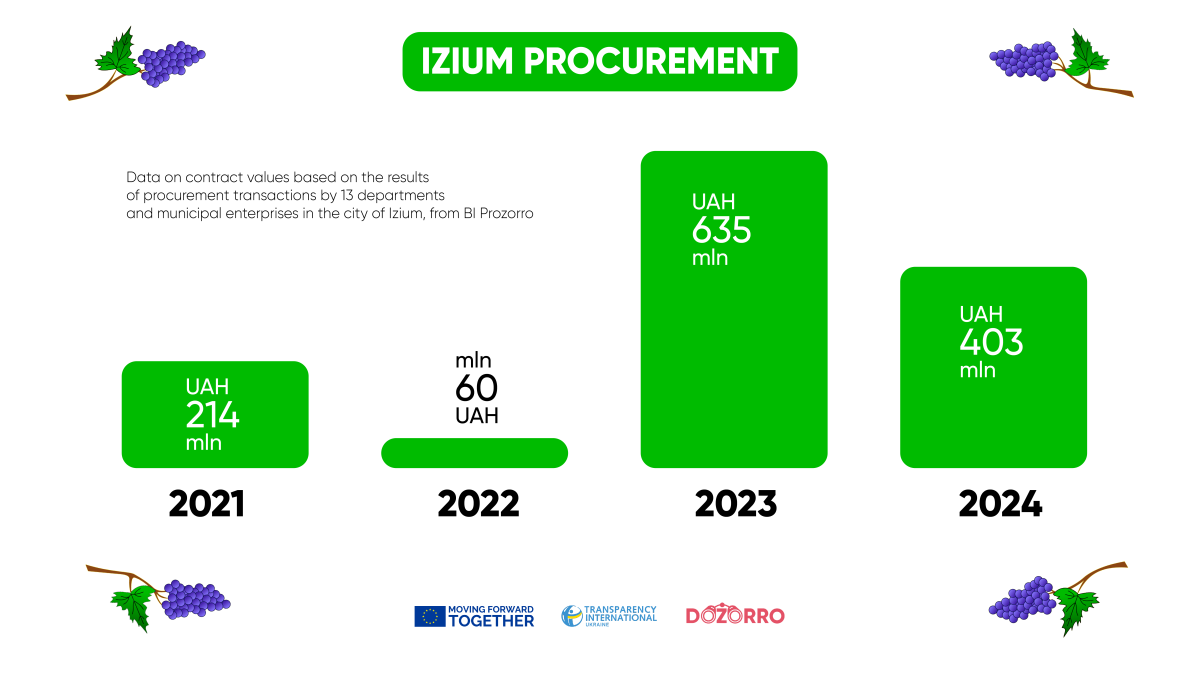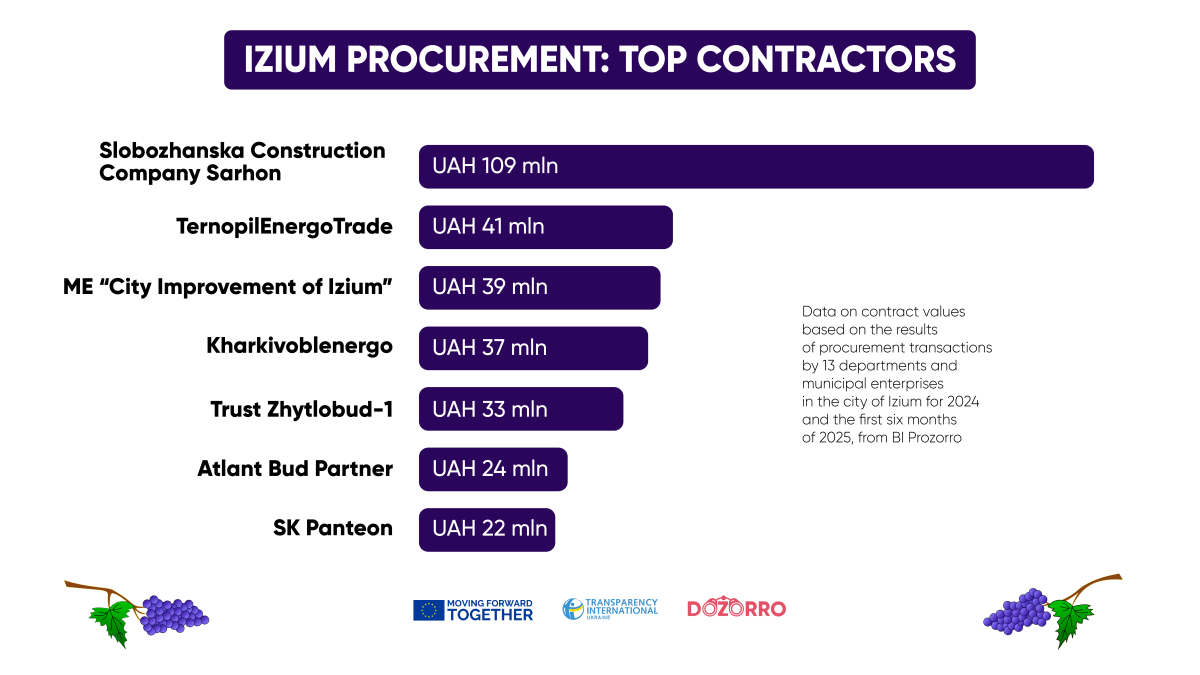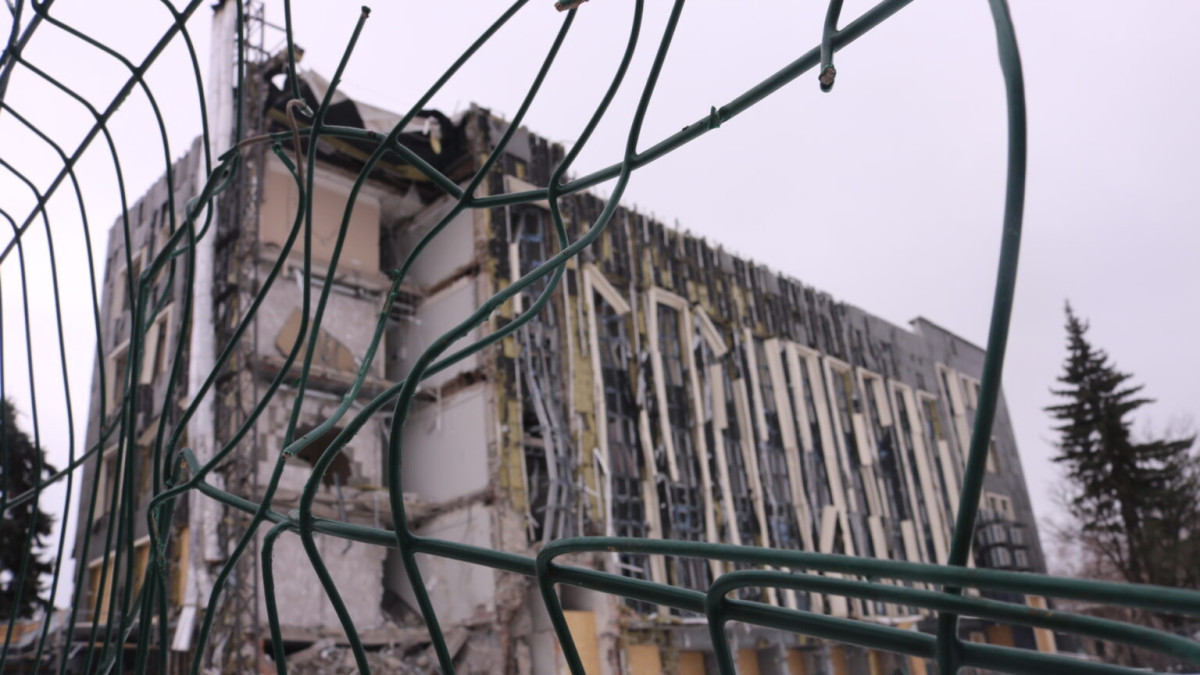

For nearly six months, Izium was under Russian occupation. The war left behind destroyed homes, damaged infrastructure — sheer devastation. Today, the city remains on the frontline. Shelling continues, yet Izium is doing its best to survive.
The DOZORRO project by TI Ukraine analyzed procurement data from 13 departments and municipal enterprises in Izium for the year 2024 and the first six months of 2025. Public procurement offers insight into how the city is rebuilding, what its priorities are, and how it manages its funds. The analysis also looked into the challenges faced by local procuring entities.
Half a billion: where the money goes
Over the past year and a half, Izium’s municipal departments and utilities signed 3,600 contracts totaling UAH 509 million, according to data from the BI Prozorro public analytics module. It is important to note that the text refers to signed contracts, not the funds that have actually been paid out.
Last year, procuring entities committed UAH 403 million; this year, they have already contracted UAH 106 million.
The largest portion — nearly UAH 261 million — was allocated to construction and routine repair work. In second place were fuel, electricity, and lubricants, accounting for another UAH 133 million. A further UAH 35 million went toward utility services, including electricity distribution and centralized water supply.
The estimated value of successful procurement transactions amounts to UAH 544 million. Nearly 48% of these were conducted through special open bidding. Another 40% were concluded through direct contracts. In 12% of cases, the procuring entities used the request for price quotations.
However, not all tenders were successful on the first attempt — some never took place at all. Due to a lack of bids, 23 tenders worth UAH 48 million failed. A likely reason is contractors’ reluctance to work in a frontline city that remains under constant shelling.
On average, three companies compete in tenders announced by Izium’s departments and municipal enterprises, according to BI Prozorro analytical data.
Who are the most active procurers
The largest amounts were contracted by: – the Department of Housing and Utility Services of the Izium City Council — UAH 164 million; the Central City Hospital of the Pishchanska Mother of God — UAH 91 million; the Izium Municipal Water and Sewerage Utility — UAH 74 million.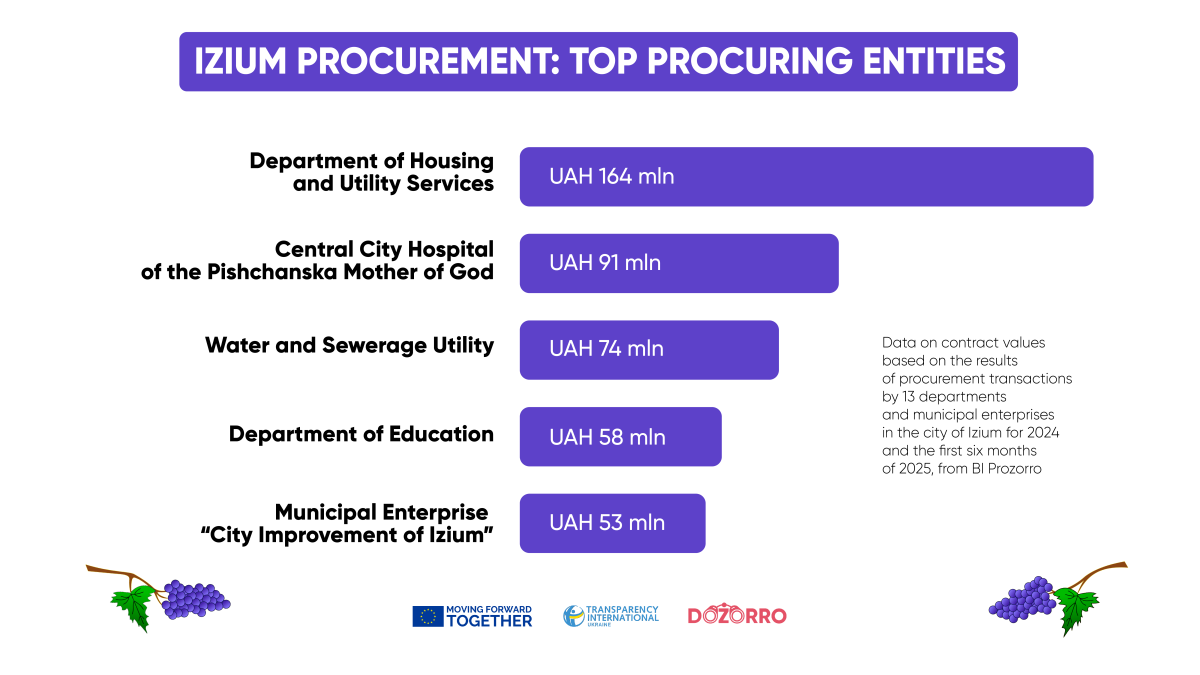
The Izium City Military Administration signed the fewest contracts — only UAH 182,000.
Last year’s procurement volume exceeded pre-war levels. In 2021, the city signed contracts worth UAH 214 million; in 2022 — just UAH 60 million, amid active hostilities. In 2023, the total value of contracts rose to UAH 635 million, with the lion’s share (UAH 370 million) allocated to rebuilding destroyed houses, restoring street lighting, bus stops, the water supply system, and repairing roads.
Overall, the increase in spending is entirely expected: following de-occupation, the city urgently needs large-scale restoration of residential buildings and basic infrastructure.
Rebuilding homes: largest projects and key contractors
Since the liberation of Izium, restoring the housing stock has been one of the city authorities’ top priorities. Renovation of apartment buildings is overseen by the local Department of Housing and Utility Services.
In a comment to Dozorro, the department noted that emergency repair and recovery works are a complex and lengthy process. Issues related to quality or timing may arise, but thanks to ongoing cooperation with contractors through meetings, written communication, or phone calls, all problems are resolved.
Major projects
The most expensive reconstruction project last year was the major repair of a multi-story apartment building at 39 Soborna Street. The contract, worth UAH 61.1 million, was signed in September 2024. This building was among the first to be damaged by airstrikes. Broken windows, a destroyed roof, a damaged facade, and utility systems — everything requires replacement. The contractor selected was the Kharkiv-based company Slobozhanska Construction Company Sarhon, which is expected to complete all work by the end of 2026.
In June of this year, an amendment agreement was signed reducing the contract value to UAH 53.4 million. As this was one of the largest contracts of the previous year, Dozorro reviewed the cost estimate and found potentially inflated prices for certain construction materials. For example, 150 mm thick mineral wool boards were listed at UAH 8,454.34 per cubic meter (including delivery). However, the contractor did not indicate the material’s density, making a precise market comparison impossible. Assuming the most typical density of 135 kg/m³, online stores offer similar insulation at UAH 4,512 and UAH 4,027 per cubic meter. Even with delivery, the insulation price appears significantly above market rates.
Prices also seem to be inflated for concrete, asphalt concrete mixtures, and curbstones.
At the end of 2024, the company was awarded another contract for additional work on the same site. The contract was worth UAH 3.3 million, but within six months, the amount was revised downward by UAH 300,000.
Last year, the Department commissioned Sarhon to repair apartments No. 40 and No. 43 in the building at 12 Hryhorii Zhukovskyi Street. The apartments had suffered damage to ceilings, walls, and water and heating systems due to shelling. The initial contract value was estimated at UAH 4.4 million, but it was later revised to UAH 4 million.
Once again, the cost estimate revealed potentially inflated prices. For example, the contractor listed 16 mm rebar at UAH 71,760 per tonne (including delivery), while its market price ranges from UAH 33,649 to UAH 35,389. Bricks were listed at UAH 19,200 per 1,000 units, whereas market prices range from UAH 7,900 to UAH 10,630. Even with delivery, these material costs significantly exceed market levels.
“We expected prices for construction materials in frontline Izium to be higher than in regions far from the front line — and that is reasonable, given the circumstances. Procuring entities themselves speak of various risks, especially related to security. However, we did not expect prices to be twice the average market level.
In addition to security-related factors, this reflects a nationwide issue in construction pricing — particularly how wages and other cost components are calculated. Ancillary costs may be embedded in material prices. We are preparing official requests to the procuring entities. If there is no response, we will review the work acceptance certificates. If overpayments persist, we will refer the matter to law enforcement,” commented Ivan Lakhtionov, Deputy Executive Director of TI Ukraine for Innovative Projects.
Another major contractor is Trust Zhytlobud-1 JSC, which was awarded a contract to restore the building at 2 Stepan Bandera Street. The building sustained damage to floor slabs, ventilation shafts, the roof, windows, and utility systems. The repair work began in 2023 with an initial contract worth UAH 36.4 million, followed by an additional contract for UAH 11 million. These contracts were later revised down to UAH 18.5 million and UAH 5.4 million, respectively. At the end of 2024, the contractor received an additional UAH 22.1 million for revised work, but this amount was later reduced to UAH 17.8 million. All these adjustments were linked to expenditure cuts.
The same company also carried out repairs on a building at 2 Vasylkivskyi Street, which required restoration of floor slabs, the facade, glazing, roofing, and utility systems. In 2023, a contract worth UAH 21.5 million was signed, followed by an additional UAH 5.6 million at the end of 2024. These amounts were later revised down to UAH 11.1 million and UAH 5 million, respectively. As before, the reductions were due to budget adjustments.
Another building — at 36 Pokrovska Street — is also being gradually restored. In December 2024, a contract worth UAH 5 million was signed for its repair; the amount was later reduced to UAH 3.8 million. In 2023, two contracts were concluded — for UAH 18 million and UAH 6.8 million — and later revised down to UAH 10.6 million and UAH 3.5 million, respectively. In all these cases, the reductions were due to adjustments in public spending.
The work carried out by Trust Zhytlobud-1 covers everything from roof repairs to window replacement.
To understand whether inflated prices are a widespread issue in the city, we randomly checked several procurement transactions by other procuring entities, including food and office supplies. No significant deviations from market prices were found in these transactions.
Challenges on the ground
In response to a request from Dozorro, the Department of Housing and Utility Services of the Izium City Military Administration outlined several challenges it faces during the reconstruction process. One of them is the reluctance of businesses to participate in public procurement.
According to BI Prozorro data, on average, only one bidder participates in each procurement. The Housing and Utility Department cites several reasons for the lack of competition: the mobilization of men liable for military service, the outflow of skilled workers, and high wage expectations. Moreover, Izium remains a frontline city, which creates additional obstacles for potential contractors. Working here means taking risks: the threat of shelling, danger to workers’ lives, and the potential loss of property.
Another recurring issue is incomplete design and estimate documentation. Often, not all required work is included in the initial scope, which later requires adjustments to the project, the scope of work, and the funding.
Despite these difficulties, the Housing and Utility Department is trying to encourage and motivate businesses to take part in procurement. To do this, the department conducts market research and works to develop clear and understandable tender documentation. It also sends invitations to potential contractors, encouraging them to participate and submit commercial proposals.
We expected prices for construction materials in frontline Izium to be higher than in regions far from the front line — and that is reasonable, given the circumstances. Procuring entities themselves speak of various risks, especially related to security. However, we did not expect prices to be twice the average market level.
Ivan Lakhtionov
Maintaining public spaces
Alongside housing reconstruction, the Housing and Utility Department is also contracting services to maintain the city’s public spaces, including street cleaning, landscaping, waste removal, and general urban upkeep.
For example, the department contracted Municipal Enterprise “City Improvement of Izium” for UAH 4.9 million in 2024 and UAH 4.5 million this year for street cleaning and sweeping. In 2023, UAH 2.7 million was contracted for landscaping, plant maintenance, and mowing; this year, the amount is slightly lower — UAH 2.3 million. An additional UAH 1.9 million in contracts was signed for removing hazardous trees and pruning branches.
Even in a frontline city, flowers bloom. Last year, City Improvement of Izium procured flower seedlings worth UAH 598,000 — petunias, salvias, and cinerarias decorated the city’s flowerbeds. This year, UAH 500,000 was contracted for flowerbed landscaping.
Supporting the Armed Forces
City Improvement of Izium, which is responsible for the city’s public amenities, also supports the Armed Forces of Ukraine. One area of support is the procurement of drones. In 2024, the utility contracted UAH 6.8 million for 325 Type-7 FPV drones. Also, it purchased an AVG ARDAL ground drone for UAH 314,000 and 30 Vartovyi SA6 drone detectors for UAH 570,000.
Another notable procurement was the purchase of three ATVs for military use, at a total cost of UAH 1.2 million.
Key contractors
The largest contracts were awarded to six private companies and one municipal enterprise. Together, their contracts account for more than half of the total procurement volume in the city.
Slobozhanska Construction Company Sarhon
The leading contractor by total value is Slobozhanska Construction Company Sarhon LLC, a Kharkiv-based firm that signed contracts worth UAH 109 million — 21% of all procurement in Izium. All contracts were for repair works. The company is owned by Ihor Kuprovskyi.
Journalists have repeatedly caught the company inflating prices for construction materials. In August 2023, the Kharkiv Anti-Corruption Center reported overpricing in Sarhon’s cost estimates for rebuilding a lyceum in Staryi Saltiv (Chuhuiv district), where the contract totalled UAH 186 million. DOZORRO also identified a UAH 3.7 million overpayment on the repair of an apartment building in Izium, contracted by the Capital Construction Department of the Kharkiv Regional State Administration.
TernopilEnergoTrade
In second place is TernopilEnergoTrade LLC, with contracts totaling UAH 41 million, 8% of the city’s total. All contracts related to electricity supply. The company was registered in August 2022 and is owned by Tetiana Hryshko.
ME “City Improvement of Izium”
In third place is the municipal enterprise City Improvement of Izium, with UAH 39 million in contracts. The company is headed by Yurii Bryl and primarily carries out routine road repairs, street cleaning, waste removal, and tree pruning.
Kharkivoblenergo
Kharkivoblenergo PJSC ranks fourth, with contracts totaling UAH 37 million. All funds were contracted for electricity distribution and commercial metering services.
Trust Zhytlobud-1
Fifth on the list is Trust Zhytlobud-1 JSC, with UAH 33 million contracted for the restoration of damaged buildings. The company is owned by Oleksandr Kharchenko, a member of the Kharkiv City Council executive committee.
Atlant Bud Partner
Contracts worth UAH 24 million were signed with Atlant Bud Partner for repairs to the city hospital. The firm is owned by Vasyl Kolisnyk and Oleh Yanchukov.
SK Panteon
SK Panteon LLC received contracts totaling UAH 22 million, also for repairs to the city hospital. The Kharkiv-based company is owned by Oleksii Buriak. Interestingly, until 2023, the firm had few public contracts; since then, its volume has surged to UAH 431 million.
The Kharkiv Anti-Corruption Center reported that the company submitted questionable documents in tenders for reconstruction projects in the Kharkiv region. In 2023, DOZORRO identified a potential overpricing of UAH 13 million in a tender for major repairs at the Regional Clinical Hospital in Kharkiv. This year, the company is suspected of overpricing by UAH 5.5 million on the construction of a protective structure for the Malynivka Lyceum No. 1 in the Kharkiv region.
General trends
The procurement data clearly show that reconstruction is currently the top priority for the de-occupied city. Nearly half of all contracts on Prozorro relate to rebuilding.
We have observed potentially inflated prices for some construction materials. Still, we believe it’s important not to jump to conclusions. Based on our experience monitoring public procurement, we know that such prices often conceal additional costs and risks that cannot be factored into project budgets in any other way. Therefore, each case of suspected overpricing must be examined individually — along with the respective procuring entity. Moreover, contractors should not be immediately blamed. Estimated material costs are often embedded at the stage of project documentation — long before the tender is held.
Even the city’s largest procuring entity — the Department of Housing and Utility Services — names poor-quality design and estimate documentation as one of the biggest challenges, alongside security risks. According to the department, the lack of complete and accurate design estimates often leads to numerous revisions, including changes in funding.
At the same time, despite its proximity to the frontline, Izium is trying to preserve elements of peaceful life. Even under these conditions, part of the funding is directed toward supporting the military — for drones, ATVs, and detection systems.
In contrast, procurement unrelated to reconstruction does not show significant deviations from market prices. This further confirms that the issue with construction tenders requires a comprehensive national-level solution. In other sectors, even in a frontline city, Izium manages to achieve fair prices.
This material is funded by the European Union. Its content is the sole responsibility of Transparency International Ukraine and does not necessarily reflect the views of the European Union.




